Global AI in Education Market is estimated to be worth USD 2.4 Billion in 2022 and is projected to grow at a CAGR of 27.2% between 2023 to 2032. The study has considered the base year as 2022, which estimates the market size of market and the forecast period is 2023 to 2032. The report analyzes and forecasts the market size, in terms of value (USD Billion), for the market. The report segments the market and forecasts it by component, by deployment, by application, by technology, by end user and region/country.
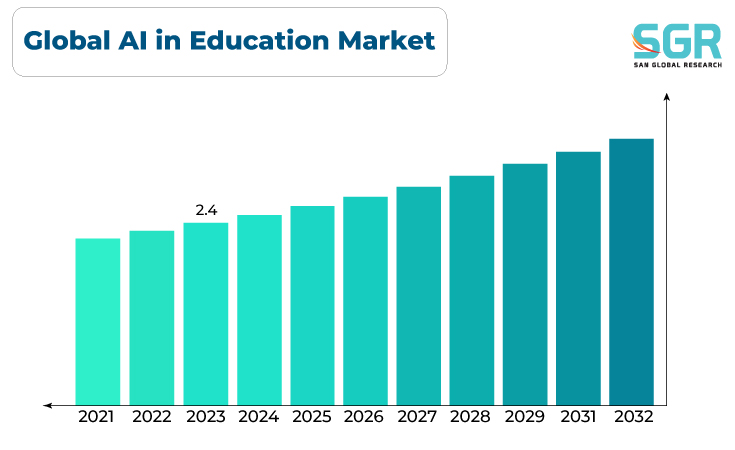
The global AI in education market represents a transformative shift in the traditional educational landscape, integrating artificial intelligence (AI) technology to enhance learning experiences and educational outcomes. AI in education encompasses various applications, including personalized learning, intelligent tutoring systems, adaptive learning platforms, and educational content creation. This technology allows for individualized learning paths tailored to students' unique strengths, weaknesses, and learning styles. Moreover, AI-powered analytics enable educators to track student progress, identify learning gaps, and deliver targeted interventions, fostering more effective teaching methodologies. Virtual tutors and chat bots equipped with AI capabilities offer personalized assistance and immediate feedback to students, promoting engagement and knowledge retention. Additionally, AI-driven tools facilitate the creation of interactive and immersive educational content, revolutionizing the way students engage with course materials. As the education sector embraces digital transformation, the global AI in education market continues to expand, offering innovative solutions that optimize learning experiences, improve educational accessibility, and pave the way for more inclusive and effective learning environments worldwide.
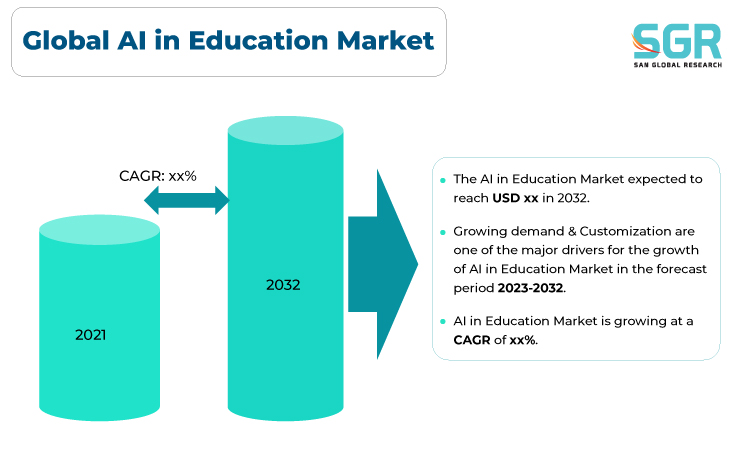
Region wise Comparison:
North America, particularly the United States and Canada, has been a significant hub for AI integration in education. The region has seen extensive utilization of AI-powered educational technologies in schools, universities, and e-learning platforms.
European countries, such as the UK, Germany, and France, have made considerable strides in adopting AI applications in education. Initiatives range from personalized learning platforms to AI-driven assessment tools in educational institutions.
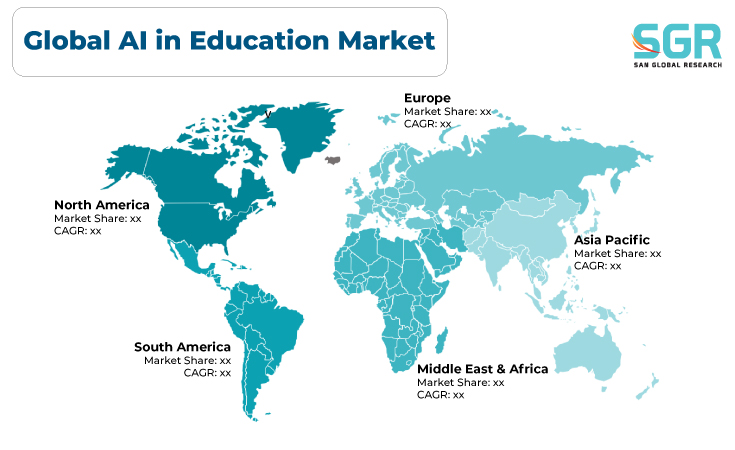
Countries in the Asia-Pacific region, including China, Japan, South Korea, India, and Singapore, have shown significant interest and investments in AI-based educational technologies. These nations are leveraging AI to enhance teaching methods, adaptive learning, and educational content delivery.
Adoption rates in Latin American countries might vary, but certain regions, like Brazil and Mexico, have begun exploring the potential of AI in education. Efforts are being made to integrate AI-driven tools into educational systems and online learning platforms.
While AI integration might be in its early stages, certain countries in the Middle East and Africa, such as the UAE and South Africa, have started piloting AI applications in educational settings, focusing on personalized learning and improving educational accessibility.
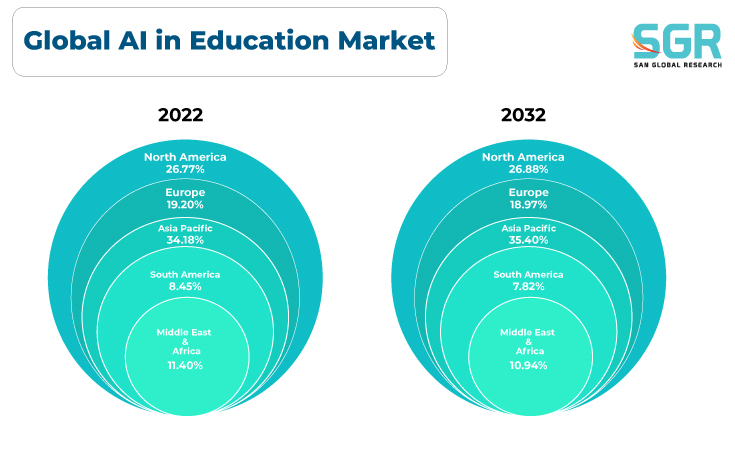
Segmentation:
The Global Artificial Intelligence in Education Market is segmented by component, by deployment, by application, by technology, by end user and region/country.
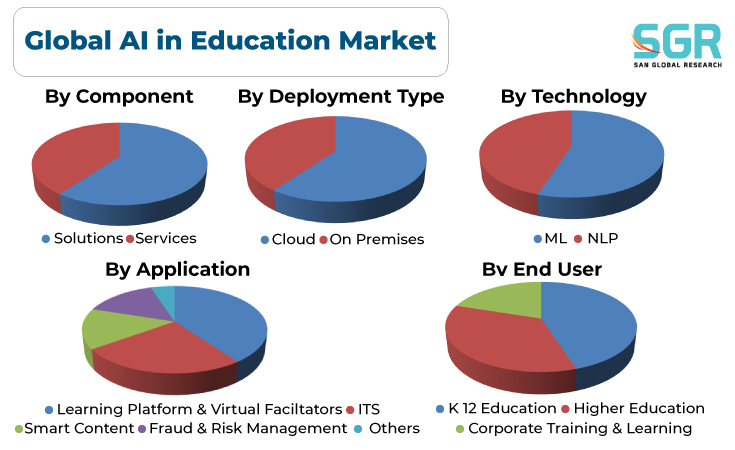
By Component:
Based on the Component, the Global Artificial Intelligence in Education Market is bifurcated into Solutions & Services – where the Solutions are dominating and ahead in terms of share.
The Global AI in Education market offers a diverse array of transformative solutions that revolutionize traditional educational paradigms. These innovative AI-powered solutions cater to personalized learning experiences, leveraging intelligent tutoring systems, adaptive learning platforms, and personalized content creation. Virtual assistants and chat bots provide instant support, while predictive analytics aids in student performance assessment and targeted interventions. Moreover, automated grading tools streamline evaluations, and language learning applications offer personalized language instruction. Embracing emotion recognition and adaptive interfaces, these solutions create dynamic and engaging learning environments. Collectively, these AI-driven tools redefine educational methodologies, enhancing engagement, personalization, and efficacy in learning outcomes across diverse educational settings worldwide.
By Deployment Type:
Based on the Deployment Type, the Global Artificial Intelligence in Education Market is bifurcated into Cloud & On Premises – where Cloud is dominating and ahead in terms of share.
By Technology:
Based on the Technology the Global Artificial Intelligence in Education Market is bifurcated into ML & NLP – where the ML is dominating and ahead of others in terms of share.
By Application:
Based on the Application, the Global Artificial Intelligence in Education Market is bifurcated into Learning Platform & Virtual Facilitators, ITS, Smart Content, Fraud & Risk Management & Others – where Learning Platform & Virtual Facilitators is dominating and ahead of others in terms of share.
By End User:
Based on the End User, the Global Artificial Intelligence in Education Market is bifurcated into K12 Education, Higher Education and Corporate Training & Learning – where the K12 Education is dominating and ahead of others in terms of share.
The key market players operating in the Global Artificial Intelligence in Education Market include
- AWS
- MICROSOFT
- IBM
- PEARSON
- NVIDIA
Drivers:
Growing sector across the globe
The Global AI in Education market is propelled by several key drivers that fuel its expansion and evolution in transforming traditional educational practices. Firstly, the escalating demand for personalized learning experiences and adaptive teaching methodologies drives the adoption of AI solutions. These technologies cater to diverse learning styles and individual student needs, offering customized learning paths and content. Secondly, the proliferation of digitalization in education, accelerated by advancements in technology, encourages the integration of AI tools into educational systems. Institutions are leveraging AI to enhance teaching methods, streamline administrative tasks, and improve overall educational outcomes. Moreover, the growing availability of vast datasets and the emergence of big data analytics enable AI to extract valuable insights, optimize learning processes, and predict student performance, further propelling market growth. Additionally, the increasing need for remote learning solutions, particularly due to global events like the COVID-19 pandemic, has accelerated the adoption of AI-powered e-learning platforms, creating opportunities for enhanced accessibility and flexibility in education. These drivers collectively underscore the transformative potential of AI in reshaping education, fostering innovation, and driving improvements in educational accessibility and efficacy on a global scale.
Opportunity:
Evolving Market
The Global AI in Education market is brimming with opportunities that revolutionize learning experiences and educational outcomes. One key opportunity lies in personalized learning solutions powered by AI algorithms, which enable tailored educational paths catering to diverse student needs and learning styles. The advancement of adaptive learning platforms presents another opportunity, allowing for real-time adjustments in content and pacing to match individual student progress. Moreover, the integration of AI-driven virtual assistants and chat bots offers instant support and guidance, fostering engagement and facilitating immediate responses to student queries. Predictive analytics tools further open doors to predict student performance and identify areas for targeted intervention, enhancing educators' ability to provide tailored support. Embracing AI for content creation and Curation facilitates the development of interactive and personalized study materials, enabling more engaging and effective learning experiences. Additionally, the growing need for remote learning solutions, including AI-driven e-learning platforms, presents an opportunity to expand educational accessibility and flexibility globally. These opportunities underscore AI's potential to transform education, creating dynamic, personalized, and inclusive learning environments that cater to diverse educational needs and preferences.
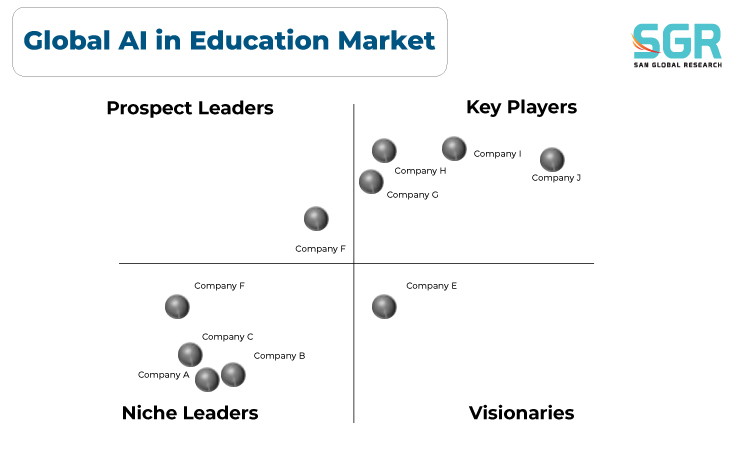

 Description
Description
 Gera Imperium Rise,
Gera Imperium Rise,  +91 9209275355
+91 9209275355


